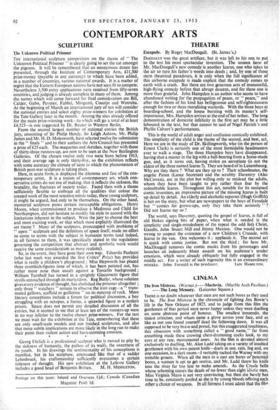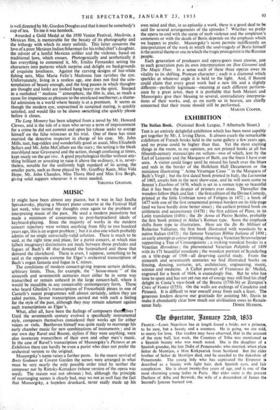CINLNIA The Iron Mistress. (Warner.)—Maclovia. (Marble Arch Pavilion.) —The Long
Memory. (Leicester Square.) THERE is no doubt whatever that men are not such bores as they used to be. The Iron Mistress is the chronicle of fighting Jim Bowie's life in the New Orleans of 1825, and to judge from this film the gentlemen of that period were never happy unless they were duelling on some abstruse point of honour. The smallest innuendo, the tiniest criticism, and wham came a glove across your face, and as like as not you found yourself dead the following dawn. It was all supposed to be very brave and proud, but this exaggerated touchiness, this obsession with something called a " good name," far from ennobling made these crowing chest-drumming cocks look, to my eyes at any rate, monumental asses. As the film is devoted almost exclusively to duelling, Mr. Alan Ladd taking on a variety of insulted gentlemen with his own patent knife—duels in sun, rain, fog and, on one occasion, in a dark room—I veritably racked the Warne' with my irritable groans. When all the men in a cast are bores or'potential bores, a woman is apt to get restive, and Mr. Ladd threw his knife into the river far too late to make amends. As the Creole belle whose scheming causes the death of no fewer than eight idiotic men, Miss Virginia Mayo is not very convincing, bin then she barely has time to be, constantly jostled as she is by young bloods offering each other a choice of weapons. In all fairness I must admit that the film is well directed by Mr. Gordon Douglas and that it must be somebody's cup of tea. To me it was hemlock.
Awarded a Gold Medal at the 1950 Venice Festival, Maclovia, a Mexican film, is memorable for the beauty of its photography and the lethargy with which its story unfolds. This latter concerns the love of a poor Mexican Indian fisherman for his tribal chief's daughter, the advent of a lustful Mexican soldier and the violence, based on traditional laws, which ensues. Photogenically and aesthetically it has everything to commend it, Mr. Emilio Fernandez setting his characters into patterns which surprise and delight on backgrounds of exquisite loveliness. Against the curving designs of lint-white fishing nets, Miss Maria Felix's Madonna face ravishes the eye. Unfortunately, living in a restless age, one does not find the con- templation of beauty enough, and the long pauses in which thoughts are thought and looks are looked hang heavy on the spirit. Steeped in a sunbaked" mafiana "atmosphere, the film is, alas, as much a cause for impatience as pleasure to the unrelaxed northerner, a shame- ful admission in a world where beauty is at a premium. It seems as though the modern eye, unpractised in sustained staring, is quickly satisfied, and would like to be shown something else quickly please before it closes.
The Long Memory has been adapted from a novel by Mr. Howard Clewes, and is the tale of a man who serves a term of imprisonment for a crime he did not commit and upon his release seeks to avenge himself on the false witnesses at his trial. One of these has since married the detective inspector in charge of his case. Mr. John Mills, taut, hag-ridden and wonderfully good as usual, Miss Elizabeth Sellars and Mr. John McCallum are the stars ; the setting is the bleak marshland near Gravesend and the action, though confusing at times, kept nicely on the qui vive. A good psychological thriller without any- thing brilliant or arresting to raise it above the ordinary, it is, never- theless, notable for the uniformly high standard of its acting, the smaller parts, such as those played by Mr. Geoffrey Keen, Miss Vida Hope, Mr. John Chandos, Miss Thora Hird and Miss Eva Bergh, giving solid support whenever it is most needed. VIRGINIA GRAHAM.



































 Previous page
Previous page